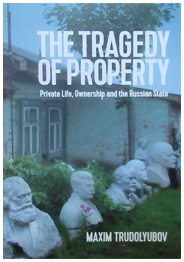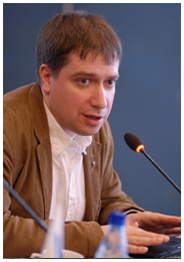MAXIM TRUDOLYUBOV | |
| Maxim Trudolyubov Maxim Trudolyubov is a Senior Fellow at the Kennan Institute and the Editor-at-Large of |
| | ||
 | Maxim Trudolyubov The Tragedy of Property: Private Life, Ownership and the Russian State Translated by Arch Tait Polity Press, 2018 Hardback, £55.00, $69.95 ISBN: 978-1-50952-700-7 Paperback, £17.99, $24.95 ISBN: 978-1-50952-701-4 237 pages Order from Waterstones UK or Amazon USA Translation kindly supported by the Zimin Foundation. | |
‘In the massive literature on Russian history, Trudolyubov’s book is unique in presenting the long and tortured story of Russian property arrangements in one coherent narrative. From land communes to communal apartments to late Soiet condominiums to the exorbitant inequality that is characteristic of contemporary Russia, we feel a bizarre, contingent logic to these twisted and often inverse developments.’ Maxim Trudolyubov uses private property as a lens to highlight the most important features that make Russia stand out as a political culture. In many Western societies, private property has acted as the private individual’s bulwark against the state; in Russia, by contrast, it has mostly been used by the authorities as a governance tool. Nineteenth-century Russian liberals did not consider property rights to be one of the civil causes worthy of defending. Property was associated with serfdom, and even after the emancipation of the serfs the institution of property was still seen as an attribute of retrograde aristocracy and oppressive government. It was something to be destroyed – and indeed it was, in 1917. Ironically, it was the Soviet Union that, with the arrival of mass housing in the 1960s, gave the concept of private ownership a good name. After forced collectivization and mass urbanization, people were yearning for a space of their own. The collapse of the Soviet ideology allowed property to be called property, but again it was tricky because not all properties were equal. You could own a flat but not an oil company, which could be property on paper but not in reality. This is why most Russian entrepreneurs register their businesses in offshore jurisdictions and park their money abroad. This fresh and highly original perspective on Russian history will be of great interest to anyone who wants to understand Russia today. |
